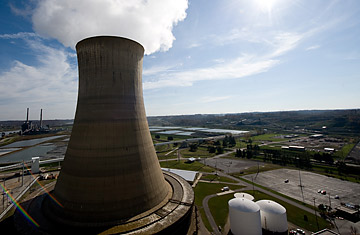
American Electric Power's Mountaineer coal power plant, including cooling tower and stacks in New Haven, West Virginia.
(2 of 2)
One target should be black carbon — a fancy word for soot — which not only causes serious respiratory problems but also contributes disproportionately to the warming of the atmosphere and especially high-altitude snow cover. (Black carbon can actually settle on white ice, darkening it and causing it to absorb more sunlight and melt faster.) Unlike carbon dioxide, black carbon is relatively easy to control with better engines and cleaner fuels, and tackling the pollutant pays off immediately for health and the climate as well. It's even bipartisan: in 2009 the staunchly Democratic senators John Kerry and Barbara Boxer joined with the Republican climate change skeptic James Inhofe to co-sponsor an effort to investigate ways to reduce black carbon.
At the same time — especially for developing countries — those alternatives need to be economically viable. The "Climate Pragmatism" paper explodes a myth that's held by many greens: that energy is too cheap. For most of the world, the opposite is true, which is why more than 1.4 billion people lack virtually any access to electricity. That's an astounding figure, but one that rarely gets the attention it deserves. Lack of electricity impacts public health — try running a modern hospital without any power — and retards economic growth. If we want developing nations to be better prepared to deal with the effects of climate change — or just about any other threat — we need to get them wired.
The challenge will to develop low-carbon alternatives that can compete with fossil fuels on price. (Subsidies are limited — already, even ultra-green countries like Germany are cutting back aid for renewable power because of the rising price tag.) In some places and some conditions, renewables are already winning — for example, in rural areas of Cameroon, where I'm currently traveling, it's often cheaper to support off the grid solar than run power lines to remote villages. But if alternatives are going to win they need to get a lot cheaper and a lot more efficient, and that's going to require vast increases in the amount of basic R&D spent on energy. The American Energy Innovation Council — a heavyweight lobbying group that includes Bill Gates — has suggested that the U.S. should increase funding for energy research around $3 billion a year to at least $15 billion annually. Some of that money could come from a small price on carbon, just as the federal gasoline tax raises money for highway construction and maintenance.
Lastly there's the pressing need to adapt to climate change. It seems like a no-brainer, but we need to think a little harder about what adaptation actually means. Thanks in part to years of UN negotiations, there's an assumption that we can actually separate adapting to climate change from preparing for any natural disaster or extreme weather. In reality, though, separating the two is nearly impossible — we still can't assign blame for specific weather events — and absolutely pointless. The climate adaptation assistance that rich nations are sending to the developing world is almost totally drawn from the existing budget for foreign aid.
A hurricane will create havoc for an unprepared population whether the storm has been strengthened by carbon emissions or not. Countries need to be prepared for all the stresses the future will bring — from extreme weather to higher energy prices to infectious disease. The watchword should be resilience — creating societies that can bounce back from anything — and the best way to do that is through continued economic development. A rich country will be better prepared for climate change than a poor country just about every time.
Most of the proposals put forth in the "Climate Pragmatism" paper aren't new — which in some ways is their virtue. Nationally and internationally, climate politics are deadlocked, even as carbon emissions keep rising and the most of the U.S. sweats through a summer that feels like a trailer for global warming to come. What's needed in this long hot season is an oblique approach to climate change, one that sidesteps the roadblocks by taking advantage of popular, no-regrets actions that are worth doing even if global warming wasn't real. It's not as simple or as elegant as one global deal — but it might actually work.
